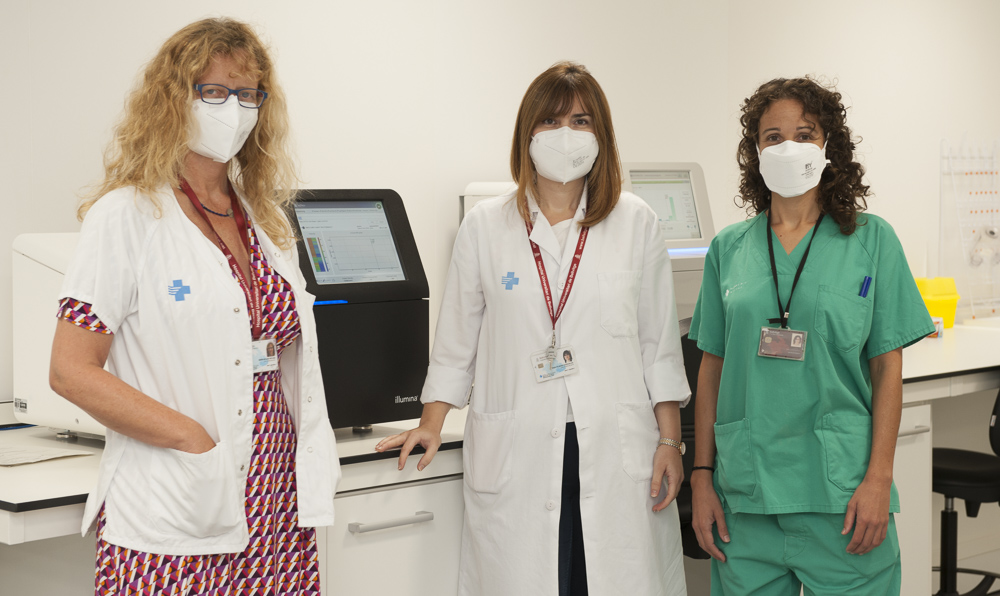A study led by the Pulmonary Interstices Functional Unit (UFIP) of the Pneumology Service of the Bellvitge University Hospital and the Pneumology research group of IDIBELL, in close collaboration with the Pulmonary Transplant Program of the Pneumology Service of the Vall d’Hebron University Hospital, the Telomeropathies Service of the Alberto Sols Biomedical Research Institute and the Genomics Division of the Technological and Renewable Energies Institute (ITER), has determined that lung transplantation also improves survival and quality of life of those patients with progressive pulmonary fibrosis with short telomeres. The study has been published in the latest issue of the prestigious scientific journal Frontiers in Medicine.
In pulmonary fibrosis, certain cells in lungs tissues lose the ability to regenerate and repair. In some cases, this inability to regenerate is known to stem in part from mutations that make telomeres – DNA sequences at the end of chromosomes – critically short or dysfunctional.
On many occasions, patients with pulmonary fibrosis with telomeric dysfunction worsen despite treatment, which is why they require lung transplantation as the only effective alternative to improve their survival. However, in recent years some studies have suggested that lung transplantation has a poor outcome in patients with telomere dysfunction, and some transplant centers in other countries had raised this dysfunction as a relative contraindication.
For the first time, this study has made a detailed prospective follow-up of the mortality, morbidity and quality of life of these transplanted patients, comparing the results of those with telomere dysfunction with those without it. In addition, the study identifies that up to half of patients with pulmonary fibrosis who require transplantation have short telomeres and telomeric mutations.
The work was carried out with patients from the Pulmonary Interstitium Functional Unit of the Bellvitge University Hospital who had been tested for telomeres for diagnosis and who required a lung transplant at the Vall d’Hebron University Hospital between June 2013 and October 2013. 2018.
Study results and follow-up indicated that one-year survival after transplantation was greater than 80% regardless of telomere dysfunction, and that there was a marked improvement in quality of life in both one group and the other.
Differences in morbidity were detected, since patients with short telomeres required extracorporeal circulation more often, suffered more early hematological complications, and had more ICU stays and long-term hospital admissions, but these are predictable and treatable complications.
The centers participating in the study have been the IDIBELL, Bellvitge University Hospital, the Vall d’Hebron University Hospital, the CSIC/UAM-IdIPAZ Institute for Biomedical Research in Madrid and the Technological and Renewable Energy Institute of Santa Cruz de Tenerife. The four participating research groups are part of the CIBER national research network (CIBERES; Dra. M. Molina-IDIBELL, Dr. A. Roman-HUVH, Dr. C. Flores-ITER, and CIBERES; Dra. R. Perona -IIB CSIC / UAM-IdIPAZ).
The Bellvitge Biomedical Research Institute (IDIBELL) is a biomedical research center created in 2004. It is participated by the Bellvitge University Hospital and the Viladecans Hospital of the Catalan Institute of Health, the Catalan Institute of Oncology, the University of Barcelona and the City Council of L’Hospitalet de Llobregat.
IDIBELL is a member of the Campus of International Excellence of the University of Barcelona HUBc and is part of the CERCA institution of the Generalitat de Catalunya. In 2009 it became one of the first five Spanish research centers accredited as a health research institute by the Carlos III Health Institute. In addition, it is part of the “HR Excellence in Research” program of the European Union and is a member of EATRIS and REGIC. Since 2018, IDIBELL has been an Accredited Center of the AECC Scientific Foundation (FCAECC).

